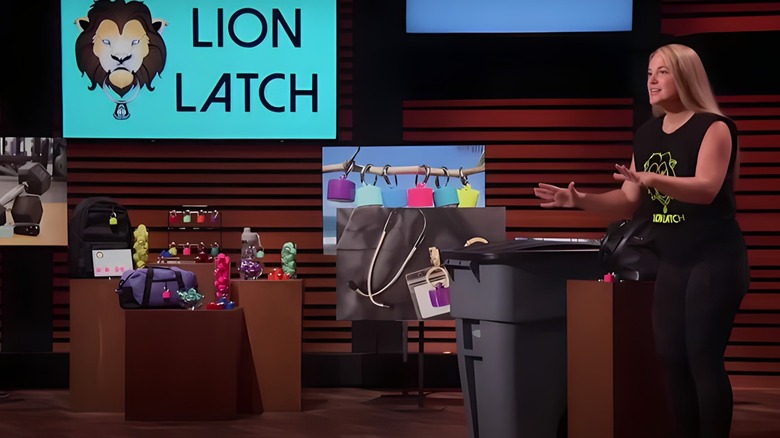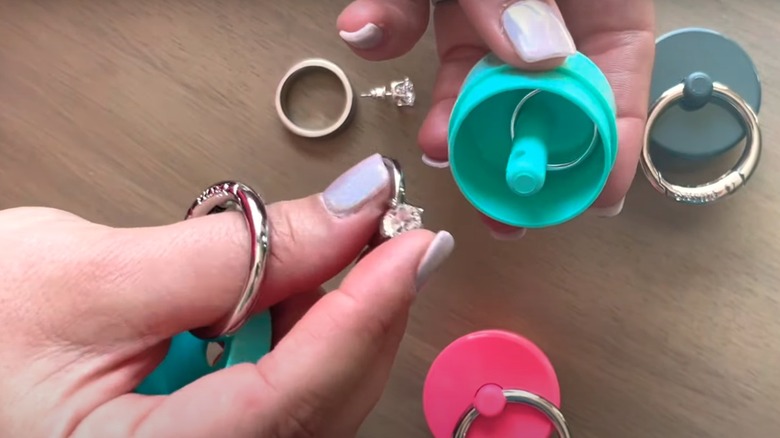Here's What Went Down With Lion Latch After Shark Tank
We may receive a commission on purchases made from links.
Wearing jewelry is a surefire way to upgrade your outfit, but it can also carry a lot of risk. Losing your favorite pieces is a big nightmare, of course. There's also the possibility of chipping precious stones and damaging links and bands. Lerin Lockwood experienced both when she coached her softball team with her engagement ring on. Catching a ball left her ring "flattened" against her finger, the impact knocking a diamond off the band.
That mistake inspired her to design a container for her baubles while she's on the move. It can be pulled apart to show a stem running through its middle, serving as an anchor for rings and links. The cap has a hole for the stem to go through so its tip, which also has an opening, remains visible when the container is closed. The whole thing is locked by clipping a carabiner to the stem, which allows the tiny storage (and everything it contains) to be attached to keys or bag handles for easy tracking. Lockwood used a 3D printer to bring her idea to reality and soon received inquiries from friends, students, and fellow coaches.
Thus, Lion Latch was born and within five years, it made $530,000 in sales. But with the demand outpacing her one-woman operation, she went on Season 13, Episode 1 of "Shark Tank" to ask for $150,000 in exchange for 15% equity. Although (spoiler alert!) Lockwood closed zero deals, she received and used a valuable tip to grow her business on her own.
Lion Latch received no investment but benefited from TV and social media exposure
The Sharks seemed impressed by Lockwood's claim of making $54,000 in net sales within the last 12 months and maintaining 100% ownership of her company. (According to the company website, she got to start her business after raising $14,000 through a crowdfunding campaign.) However, Mark Cuban couldn't see Lion Latch as a multi-million-dollar enterprise. Lori Greiner believed the company's manufacturing problem wasn't impossible to solve, but she didn't find it investible either. Barbara Corcoran expressed admiration for Lockwood's tenacity yet ultimately thought her business was "too small." Kevin O'Leary and guest Shark Emma Grede also weren't interested, so Lockwood left the show with no investor.
Despite this setback, she was soon inundated with wholesale inquiries from other businesses. A 2020 feature on "Good Morning America" and winning the Texas Department of Agriculture's Go Texan People's Choice Award also increased visibility. The biggest boost, however, came from social media, with Lion Latch having nearly 409,000 followers and 25 million likes on TikTok. This has led more people to discover the brand's practicality for storing jewelry and other small items.
Because of the positive reaction, the social media site asked Lion Latch to be one of its first TikTok shops this year, and it ended up shipping over 20,000 orders within its first three months. This success got Lockwood invited to be a part of the TikTok shops panel at the Cannes Lion Festival in France last June.
The Lion Latch founder maintains 100% ownership of her business
From a single patented product, Lion Latch now offers a variety of items. Aside from the classic container which comes in different colors and motifs, it also sells Air Tag holders to keep track of one's Lion Latch; the shoe- and glove-deodorizing Stank Stix; a glow-in-the-dark tumbler set; and a multifunctional Lion Pack bag. In addition to the brand's website and TikTok shop, Lion Latch merchandise can also be purchased from its Amazon page.
Lockwood's belief in her product turned a Shark Tank rejection into a learning opportunity for scaling her business. In 2021, she credited Greiner in an Instagram post for her advice to find a Texas-based manufacturer to meet customer demand. This has been key to Lion Latch's success and, according to a company update, has allowed the business to move into its official headquarters this year.
In a recent TikTok video that has earned nearly 9 million views, Lockwood recounted how the critiques she had received from the investors were painful but helpful. " ... I think the Sharks were looking out for me because look at the amount of orders that I'm doing on TikTok shop," she reflected. "And just think of how heartbreaking it would be if I had to share a percentage of these sales with somebody." Yep, she's still the sole owner of her business. Hers is yet another success story about an entrepreneur leaving the tank empty-handed only to find bigger doors opening.

